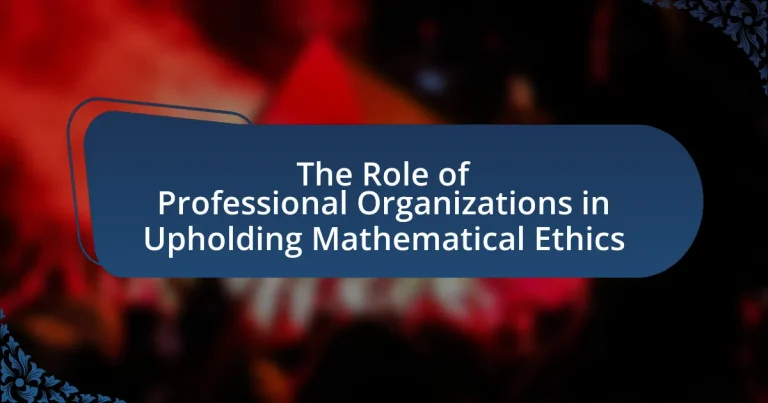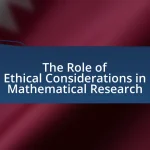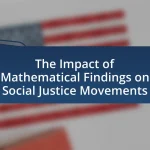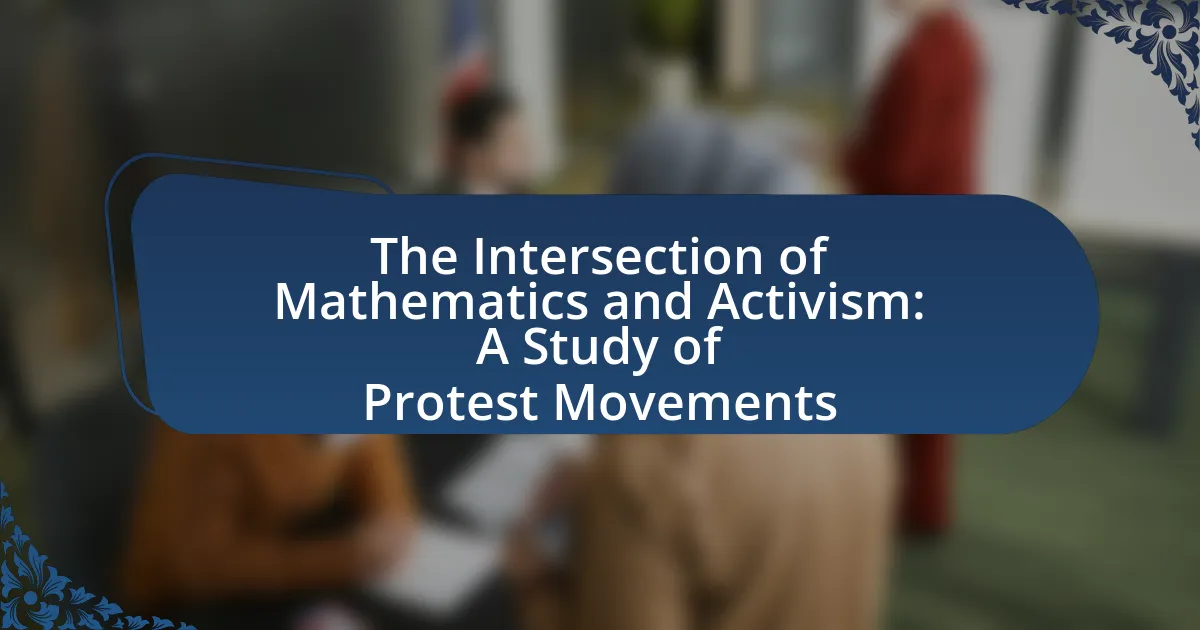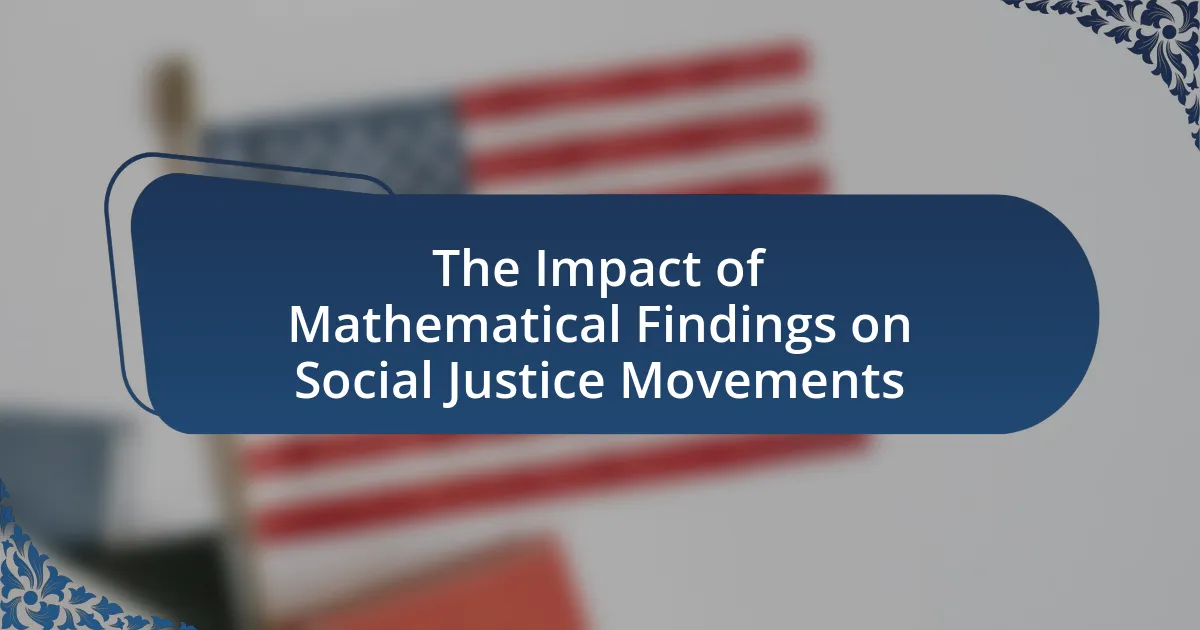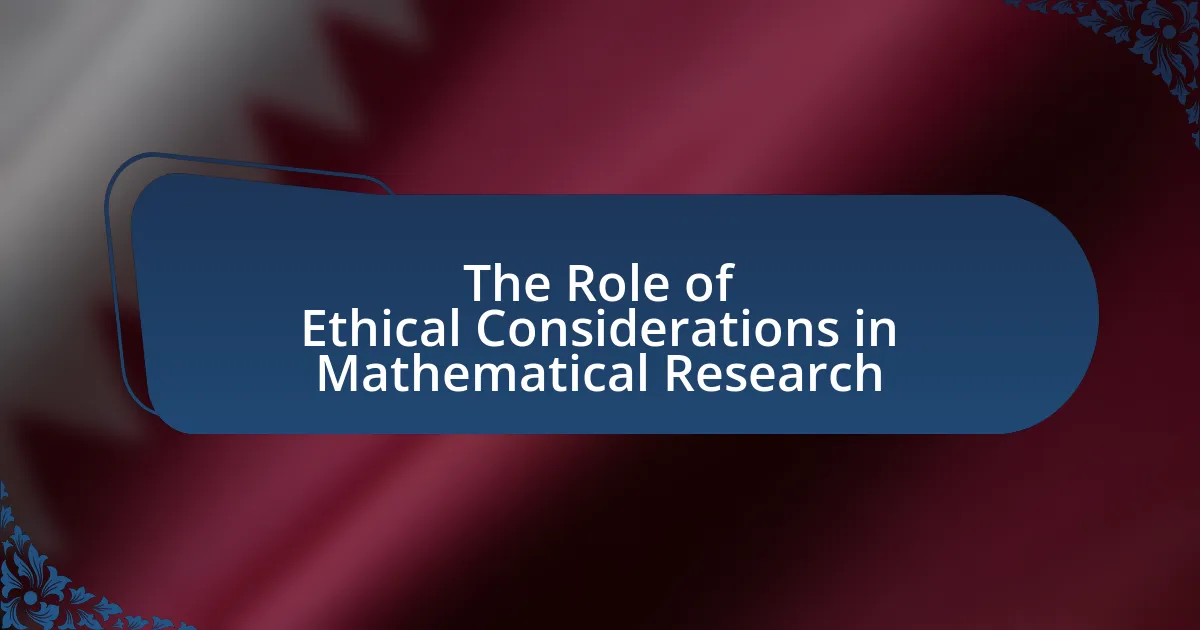Professional organizations, such as the American Mathematical Society and the Mathematical Association of America, play a vital role in upholding mathematical ethics by establishing standards, providing guidelines, and fostering a culture of integrity within the mathematical community. They define mathematical ethics as principles guiding the conduct of mathematicians, emphasizing integrity, transparency, and accountability. These organizations implement codes of conduct, offer educational resources, and address ethical violations to maintain the credibility of mathematical research. Additionally, they face challenges related to cultural differences and evolving technologies, necessitating ongoing adaptation of ethical frameworks to ensure responsible practices in mathematics.
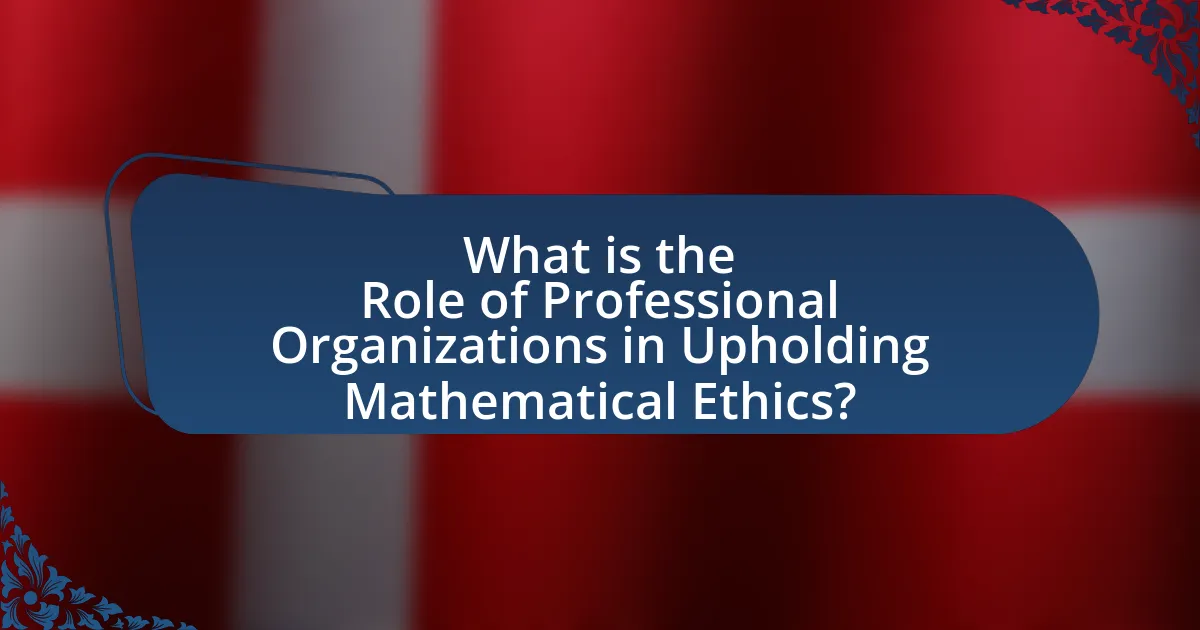
What is the Role of Professional Organizations in Upholding Mathematical Ethics?
Professional organizations play a crucial role in upholding mathematical ethics by establishing standards, providing guidelines, and fostering a culture of integrity within the mathematical community. These organizations, such as the American Mathematical Society and the Mathematical Association of America, create codes of ethics that outline acceptable practices and behaviors for mathematicians. For instance, they emphasize the importance of honesty in research, proper attribution of work, and the responsible use of mathematical models. Additionally, these organizations often provide resources for education and training on ethical issues, helping members navigate complex situations. By promoting ethical standards and offering support, professional organizations ensure that mathematicians adhere to principles that maintain public trust and the integrity of the discipline.
How do professional organizations define mathematical ethics?
Professional organizations define mathematical ethics as a set of principles and standards that guide the conduct of mathematicians and related professionals in their work. These organizations emphasize integrity, honesty, and responsibility in mathematical practice, ensuring that mathematical knowledge is used ethically and responsibly. For instance, the American Mathematical Society outlines ethical guidelines that include the importance of transparency in research, proper attribution of ideas, and the avoidance of conflicts of interest. Such definitions are crucial for maintaining public trust in mathematical research and its applications.
What are the key principles of mathematical ethics established by these organizations?
The key principles of mathematical ethics established by professional organizations include integrity, transparency, and accountability. Integrity emphasizes the importance of honesty in mathematical work, ensuring that results are reported accurately and without fabrication. Transparency involves clear communication of methodologies and findings, allowing for reproducibility and scrutiny by peers. Accountability holds mathematicians responsible for their work and its implications, promoting ethical decision-making in research and application. These principles are foundational in fostering trust and credibility within the mathematical community and are often outlined in codes of ethics by organizations such as the American Mathematical Society and the Society for Industrial and Applied Mathematics.
How do these principles guide the behavior of mathematicians?
Mathematical principles guide the behavior of mathematicians by establishing a framework for ethical conduct, collaboration, and integrity in research. These principles, often reinforced by professional organizations, promote honesty in data reporting, respect for intellectual property, and adherence to rigorous standards of proof. For instance, the American Mathematical Society emphasizes the importance of ethical behavior in its guidelines, which serve as a reference for mathematicians to navigate ethical dilemmas. This adherence to established principles fosters a culture of trust and accountability within the mathematical community, ensuring that mathematicians engage in responsible practices that uphold the integrity of the discipline.
Why are professional organizations important for mathematical ethics?
Professional organizations are crucial for mathematical ethics because they establish standards and guidelines that promote integrity and accountability within the field. These organizations, such as the American Mathematical Society, provide a framework for ethical behavior, ensuring that mathematicians adhere to principles that prevent misconduct, such as plagiarism and data manipulation. Furthermore, they offer resources for education and training on ethical practices, which is essential for fostering a culture of responsibility among professionals. By facilitating discussions and providing platforms for addressing ethical dilemmas, these organizations play a vital role in maintaining the credibility and trustworthiness of mathematical research and applications.
What impact do these organizations have on the integrity of mathematical research?
Professional organizations significantly enhance the integrity of mathematical research by establishing ethical standards and promoting best practices among researchers. These organizations, such as the American Mathematical Society and the Society for Industrial and Applied Mathematics, provide guidelines that help ensure transparency, accountability, and rigor in research methodologies. For instance, they often publish codes of conduct that outline expectations for ethical behavior, which researchers are encouraged to follow. Additionally, these organizations facilitate peer review processes that critically evaluate research before publication, thereby reducing the likelihood of fraudulent or erroneous findings. By fostering a culture of integrity and ethical compliance, these organizations play a crucial role in maintaining trust in the mathematical community and the validity of its research outputs.
How do they influence public perception of mathematics and its practitioners?
Professional organizations influence public perception of mathematics and its practitioners by establishing standards of ethics and promoting the value of mathematics in society. These organizations, such as the American Mathematical Society and the Mathematical Association of America, provide resources, guidelines, and recognition for ethical practices, which enhances the credibility of mathematicians. For instance, their endorsement of ethical behavior in research and education fosters trust among the public, as evidenced by surveys indicating that adherence to ethical standards correlates with increased public confidence in mathematical findings. Furthermore, these organizations often engage in outreach and education initiatives that highlight the importance of mathematics in addressing real-world problems, thereby shaping a positive image of the discipline and its professionals.
What mechanisms do professional organizations use to promote ethical standards?
Professional organizations promote ethical standards through mechanisms such as establishing codes of ethics, providing training and resources, and enforcing compliance through disciplinary actions. Codes of ethics serve as foundational documents that outline expected behaviors and principles for members, guiding their professional conduct. Training programs and resources, including workshops and seminars, equip members with the knowledge and skills necessary to navigate ethical dilemmas in their field. Additionally, organizations enforce compliance by investigating violations and imposing sanctions, thereby reinforcing the importance of ethical adherence. These mechanisms collectively ensure that ethical standards are upheld within the profession.
How do codes of conduct play a role in maintaining ethical practices?
Codes of conduct are essential in maintaining ethical practices by providing clear guidelines and standards for behavior within professional organizations. These codes establish expectations for integrity, accountability, and respect, which help to foster a culture of ethical decision-making. For instance, the American Mathematical Society’s code emphasizes the importance of honesty and fairness in mathematical research and education, thereby reinforcing ethical standards among its members. By outlining specific behaviors that are deemed acceptable or unacceptable, codes of conduct serve as a framework for evaluating actions and resolving ethical dilemmas, ultimately promoting trust and professionalism within the mathematical community.
What educational resources do these organizations provide to uphold ethics?
Professional organizations provide various educational resources to uphold ethics, including guidelines, training programs, and workshops. For instance, the American Mathematical Society offers a Code of Ethics and resources for ethical decision-making in mathematical practice. Additionally, the Mathematical Association of America provides workshops and webinars focused on ethical issues in mathematics education. These resources are designed to educate members about ethical standards and promote integrity within the mathematical community.
How do professional organizations address ethical violations in mathematics?
Professional organizations address ethical violations in mathematics through established codes of conduct, investigation procedures, and disciplinary actions. These organizations, such as the American Mathematical Society and the Mathematical Association of America, implement specific guidelines that outline acceptable professional behavior and the consequences for violations. For instance, when a violation is reported, these organizations typically conduct a thorough investigation to assess the validity of the claims, ensuring due process for the accused. If the investigation confirms unethical behavior, disciplinary measures may include censure, suspension, or expulsion from the organization. This structured approach not only maintains the integrity of the profession but also reinforces the importance of ethical standards in mathematical practice.
What processes are in place for reporting unethical behavior?
Professional organizations typically implement formal reporting processes for unethical behavior, which often include a designated ethics committee or board responsible for receiving and investigating complaints. These processes usually involve submitting a written report detailing the unethical conduct, which is then reviewed by the committee to determine if further action is warranted. Many organizations also provide anonymous reporting options to encourage individuals to come forward without fear of retaliation. For example, the American Mathematical Society has established a clear protocol for reporting ethical violations, ensuring that all claims are taken seriously and investigated thoroughly.
How do organizations enforce consequences for ethical breaches?
Organizations enforce consequences for ethical breaches through established policies and disciplinary procedures. These procedures typically include investigations into reported breaches, which may involve gathering evidence and interviewing relevant parties. Following the investigation, organizations may impose sanctions such as reprimands, suspension, or termination, depending on the severity of the breach. For instance, the American Mathematical Society has a code of ethics that outlines specific consequences for violations, reinforcing accountability within the mathematical community. This structured approach ensures that ethical standards are upheld and that members understand the repercussions of unethical behavior.
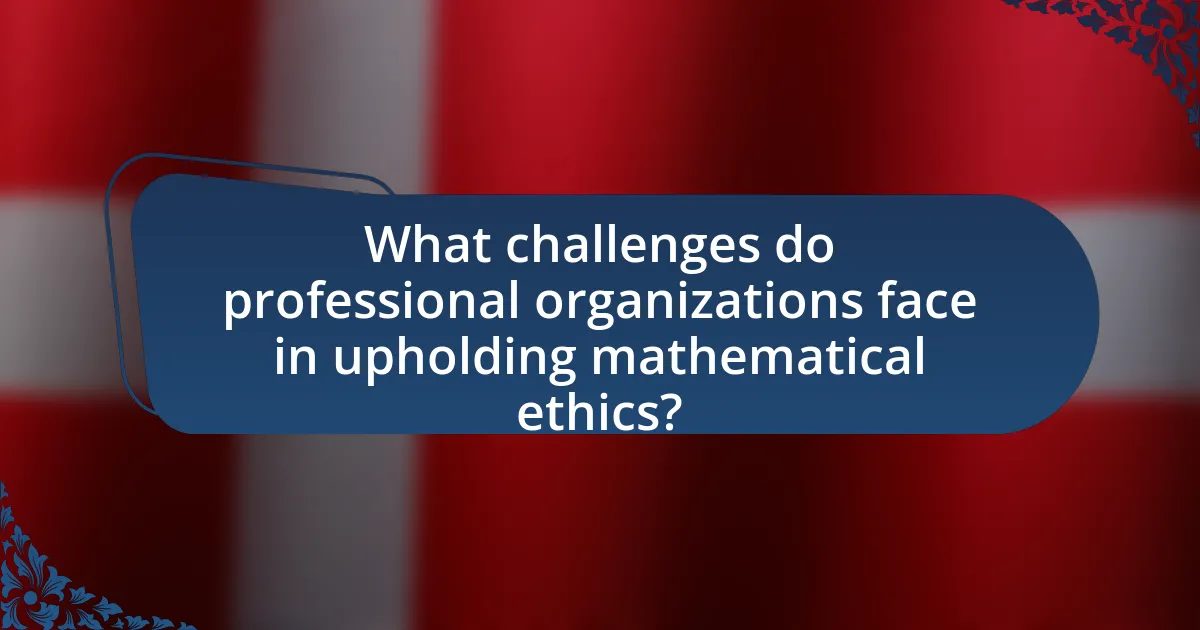
What challenges do professional organizations face in upholding mathematical ethics?
Professional organizations face significant challenges in upholding mathematical ethics, primarily due to the diversity of ethical standards across different cultures and disciplines. This diversity can lead to inconsistencies in ethical practices, making it difficult for organizations to establish a unified code of conduct. Additionally, the rapid advancement of technology and data science introduces new ethical dilemmas, such as issues related to data privacy and algorithmic bias, which organizations must navigate without clear guidelines. Furthermore, the pressure to publish and secure funding can incentivize unethical behavior, such as data manipulation or plagiarism, complicating the enforcement of ethical standards. These challenges highlight the need for ongoing dialogue and adaptation of ethical frameworks within professional organizations to effectively address emerging issues in the field of mathematics.
How do evolving technologies impact mathematical ethics?
Evolving technologies significantly impact mathematical ethics by introducing new challenges related to data privacy, algorithmic bias, and transparency. As mathematical models increasingly influence decision-making in various sectors, ethical considerations must adapt to ensure fairness and accountability. For instance, the rise of machine learning algorithms has highlighted issues of bias, where data-driven decisions can perpetuate existing inequalities, necessitating ethical frameworks that address these concerns. Furthermore, the use of big data raises questions about consent and the ethical use of personal information, prompting professional organizations to establish guidelines that uphold ethical standards in mathematical practices.
What ethical dilemmas arise from the use of artificial intelligence in mathematics?
The use of artificial intelligence in mathematics raises several ethical dilemmas, primarily concerning bias, accountability, and transparency. Bias can occur when AI systems are trained on datasets that reflect historical inequalities, leading to skewed mathematical outcomes that perpetuate discrimination. For instance, if an AI model is developed using biased data, it may produce results that favor certain demographics over others, undermining fairness in mathematical applications.
Accountability becomes a significant issue when AI systems make decisions or generate solutions without clear human oversight. This lack of accountability can lead to challenges in determining who is responsible for errors or harmful consequences resulting from AI-generated mathematical conclusions. For example, if an AI algorithm used in financial modeling leads to significant losses, it may be unclear whether the developers, users, or the AI itself should be held accountable.
Transparency is also a critical ethical concern, as many AI algorithms operate as “black boxes,” making it difficult for users to understand how decisions are made. This opacity can hinder trust in mathematical results produced by AI, as stakeholders may question the validity and reliability of outcomes that lack clear explanatory frameworks. The ethical implications of these dilemmas highlight the need for professional organizations to establish guidelines that promote fairness, accountability, and transparency in the integration of AI within mathematical practices.
How can organizations adapt to these technological changes?
Organizations can adapt to technological changes by implementing continuous training programs for their employees. These programs ensure that staff remain updated on the latest tools and methodologies relevant to their fields. For instance, a study by the World Economic Forum in 2020 highlighted that 94% of business leaders expect employees to pick up new skills on the job, emphasizing the importance of ongoing education in a rapidly evolving technological landscape. Additionally, organizations can foster a culture of innovation by encouraging collaboration and experimentation, which allows them to leverage new technologies effectively.
What role does globalization play in mathematical ethics?
Globalization significantly influences mathematical ethics by promoting the exchange of ideas and standards across diverse cultures and professional organizations. This interconnectedness allows for the establishment of universal ethical guidelines that can be adopted globally, ensuring consistency in mathematical practices. For instance, organizations like the International Mathematical Union facilitate collaboration among mathematicians worldwide, fostering a shared understanding of ethical responsibilities. This global dialogue helps address ethical dilemmas that arise from differing cultural perspectives, ultimately enhancing the integrity and accountability of mathematical work on an international scale.
How do cultural differences affect the perception of mathematical ethics?
Cultural differences significantly influence the perception of mathematical ethics by shaping the values and norms that individuals and communities associate with ethical behavior in mathematics. For instance, in collectivist cultures, the emphasis on community and group harmony may lead to a perception of mathematical ethics that prioritizes collaboration and shared knowledge, whereas individualistic cultures may focus more on personal integrity and accountability in mathematical practices. Research by Niss and Højgaard (2011) in “Competencies and the Curriculum” highlights that cultural contexts can dictate what is considered ethical, as different societies may have varying expectations regarding honesty, transparency, and the use of mathematical knowledge. This variation underscores the importance of understanding cultural backgrounds when discussing ethical standards in mathematics, as professional organizations must navigate these differences to effectively promote and uphold ethical practices across diverse cultural landscapes.
What strategies can organizations employ to address these differences?
Organizations can employ strategies such as establishing clear ethical guidelines, promoting diversity and inclusion, and providing ongoing training to address differences in mathematical ethics. Clear ethical guidelines help set standards for behavior and decision-making, ensuring that all members understand the expectations. Promoting diversity and inclusion fosters a culture where varied perspectives are valued, which can lead to more comprehensive ethical considerations. Ongoing training ensures that members stay informed about ethical practices and the importance of integrity in mathematics, reinforcing the organization’s commitment to upholding ethical standards.
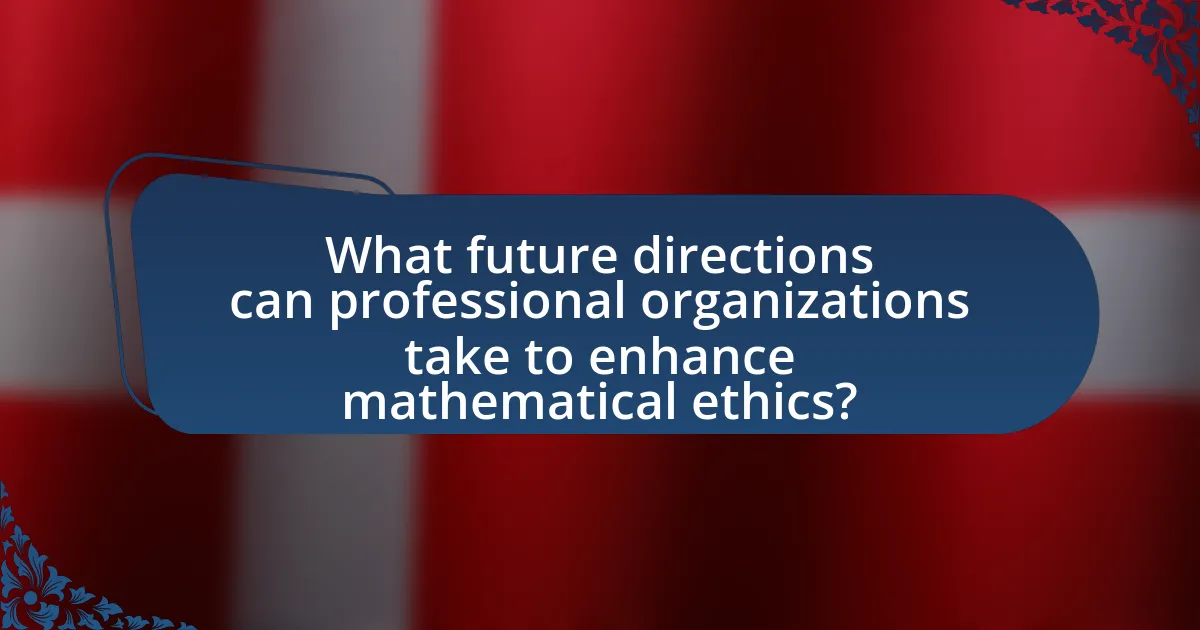
What future directions can professional organizations take to enhance mathematical ethics?
Professional organizations can enhance mathematical ethics by developing comprehensive ethical guidelines and providing ongoing education for their members. These organizations should establish clear standards that address contemporary ethical dilemmas in mathematics, such as data privacy, algorithmic bias, and the ethical use of mathematical models. For instance, the American Mathematical Society has previously emphasized the importance of ethical considerations in mathematical research and practice, which serves as a model for other organizations. Additionally, implementing regular workshops and seminars focused on ethical issues can foster a culture of ethical awareness and responsibility among mathematicians. By actively engaging in discussions about ethics and promoting best practices, professional organizations can significantly influence the ethical landscape of the mathematical community.
How can collaboration among organizations improve ethical standards?
Collaboration among organizations can improve ethical standards by fostering shared values and best practices. When organizations work together, they can establish common ethical guidelines that promote accountability and transparency. For instance, the collaboration between the American Mathematical Society and the Society for Industrial and Applied Mathematics has led to the development of ethical codes that guide mathematical research and application. This joint effort not only enhances the credibility of the organizations involved but also encourages adherence to ethical standards across the mathematical community, as evidenced by increased compliance with established ethical norms in collaborative research projects.
What partnerships can be formed to strengthen ethical practices in mathematics?
Partnerships between educational institutions, professional organizations, and industry stakeholders can be formed to strengthen ethical practices in mathematics. Educational institutions can collaborate with professional organizations, such as the American Mathematical Society, to develop curricula that emphasize ethical considerations in mathematical research and application. Additionally, partnerships with industry stakeholders can facilitate the sharing of best practices and ethical standards, ensuring that mathematical applications in fields like finance and technology adhere to ethical guidelines. Research indicates that such collaborations enhance awareness and adherence to ethical practices, as seen in initiatives like the Ethical Guidelines for Statistical Practice by the American Statistical Association, which promotes ethical standards across various sectors.
How can shared resources benefit the promotion of mathematical ethics?
Shared resources can significantly benefit the promotion of mathematical ethics by providing accessible educational materials, guidelines, and collaborative platforms for mathematicians. These resources facilitate the dissemination of ethical standards and best practices, ensuring that professionals are informed about ethical considerations in their work. For instance, organizations like the American Mathematical Society offer shared resources that include ethical guidelines and case studies, which help mathematicians navigate complex ethical dilemmas. By utilizing these resources, professionals can engage in informed discussions and foster a culture of ethical awareness within the mathematical community.
What best practices should organizations adopt for effective ethical oversight?
Organizations should adopt a framework of transparency, accountability, and continuous education for effective ethical oversight. Implementing clear ethical guidelines and policies ensures that all members understand the standards expected of them. Regular training sessions on ethical practices reinforce these standards and keep members informed about evolving ethical considerations. Additionally, establishing an independent ethics committee can provide oversight and address ethical dilemmas, ensuring impartiality in decision-making. Research indicates that organizations with strong ethical oversight frameworks report higher levels of trust and integrity among their members, which is crucial for maintaining professional standards in fields such as mathematics.
How can continuous education and training improve ethical awareness among members?
Continuous education and training enhance ethical awareness among members by providing ongoing exposure to ethical standards and dilemmas relevant to their field. This consistent engagement fosters a deeper understanding of ethical principles and encourages members to reflect on their professional responsibilities. Research indicates that organizations that implement regular training programs see a significant increase in ethical decision-making, as members become more adept at recognizing and addressing ethical issues. For instance, a study published in the Journal of Business Ethics found that companies with robust ethics training programs reported a 30% decrease in unethical behavior among employees. This evidence underscores the effectiveness of continuous education in cultivating a culture of ethical awareness within professional organizations.
What role does transparency play in fostering trust within the mathematical community?
Transparency is crucial in fostering trust within the mathematical community as it ensures open communication and accountability among mathematicians. When research findings, methodologies, and peer review processes are shared openly, it allows for scrutiny and validation, which enhances the credibility of the work. For instance, initiatives like open-access journals and preprint archives promote transparency by making research accessible to all, thereby encouraging collaboration and reducing the likelihood of misconduct. Studies have shown that communities with higher transparency levels report increased trust among members, as evidenced by the success of organizations like the American Mathematical Society, which emphasizes ethical standards and transparency in its publications and conferences.
What practical steps can mathematicians take to uphold ethical standards?
Mathematicians can uphold ethical standards by adhering to established codes of conduct and engaging in continuous professional development. Professional organizations, such as the American Mathematical Society, provide guidelines that outline ethical practices, including integrity in research, transparency in data reporting, and respect for intellectual property. By participating in workshops and seminars offered by these organizations, mathematicians can stay informed about ethical issues and best practices in their field. Furthermore, mathematicians should actively report unethical behavior and support a culture of accountability within their professional communities, reinforcing the importance of ethical standards in mathematical research and application.
